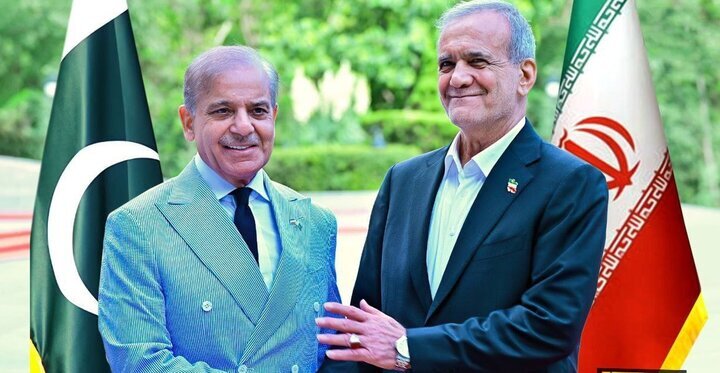Strategic solidarity: President Pezeshkian’s visit underscores Iran–Pakistan alliance

TEHRAN — The official two-day visit of Iranian President Masoud Pezeshkian to Pakistan underscores the deepening and friendly relations between the two neighboring nations, bound by shared history, faith, and mutual strategic interests.
President Pezeshkian is set to arrive in Pakistan on Saturday at the invitation of Prime Minister Shehbaz Sharif. During his first official visit to the country, he will hold high-level talks with PM Sharif, President Asif Ali Zardari, and senior political and military officials.
Accompanying him is a high-profile delegation, including Foreign Minister Abbas Araghchi and key cabinet members, reflecting Tehran’s commitment to elevating bilateral engagement on all fronts.
According to Pakistan’s Foreign Office, the visit aims to further cement the “brotherly relations” between the two countries, which span political, economic, religious, and cultural dimensions.
Mehdi Sanaei, the Iranian president's political adviser, confirmed that the visit would also include meetings with Pakistan’s “cultural and commercial elites,” focusing on enhancing border cooperation and increasing bilateral trade from the current $3 billion.
Highlighting the visit’s regional significance, Syed Aoon Sherazi, Head of the Investigation Cell at Such News Pakistan, told the Tehran Times that President Pezeshkian’s trip “holds promising prospects for regional stability, economic cooperation, and stronger Muslim unity — a much-needed step toward a more connected and self-reliant neighborhood.”
Haseeb ur Rehman, a journalist affiliated with Balochistan Express, Quetta and Huashang news, emphasized the visit’s timing, particularly in light of recent Israeli aggression against Iran. “Pezeshkian’s trip sends a strong signal that Iran is looking to re-engage with its immediate neighbors, especially Pakistan, at a time when regional dynamics are shifting rapidly,” he said.
Ur Rehman noted that the visit “provides a crucial opportunity to deepen cooperation in areas like trade, energy, connectivity, and border management.”
He also touched on likely outcomes: “We may see a renewed commitment to security coordination, progress on cross-border trade mechanisms, and perhaps a revival of energy projects that were previously stalled due to international sanctions or political constraints. Most importantly, it offers both nations a chance to build strategic trust — essential to jointly address transnational challenges like militancy, smuggling, and regional instability.”
Islamabad has stood firmly by Tehran, especially during the 12-day Israeli-US aggression on Iran in June, reaffirming its solidarity with the Iranian people in the face of external pressures. That support reflects a maturing alliance grounded in principled diplomacy and mutual respect.
Earlier, in May 2025, PM Sharif visited Iran, where he met with Leader of the Islamic Revolution Ayatollah Seyyed Ali Khamenei and President Pezeshkian. Discussions at the time centered on trade expansion, regional peace, and infrastructure connectivity.
President Pezeshkian’s visit to Pakistan marks not just a ceremonial gesture, but a strategic milestone. In an era of global uncertainty and shifting power dynamics, Iran and Pakistan are demonstrating that regional solidarity, economic collaboration, and mutual security are more powerful than external pressures and divisive narratives.
The growing partnership between Tehran and Islamabad represents a vision of a self-reliant Muslim world — one that prioritizes peace over provocation, cooperation over competition, and sovereignty over subjugation. As both countries chart a path forward, their shared commitment to regional stability and development will remain a pillar for progress not only for themselves but for the entire region.
Leave a Comment